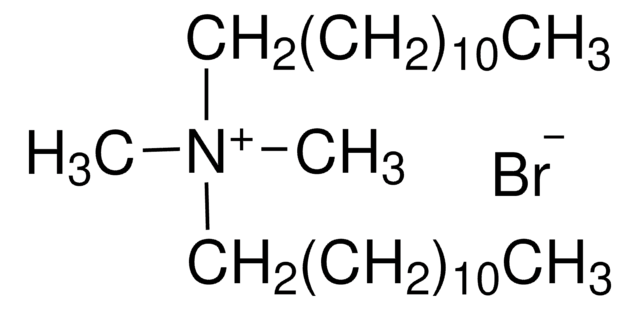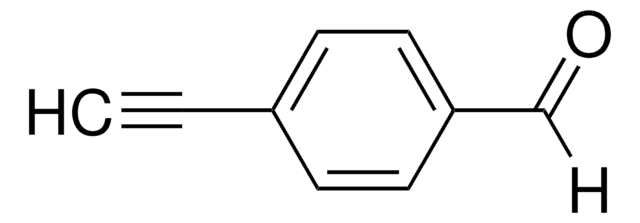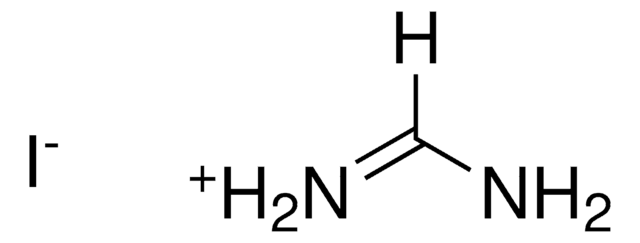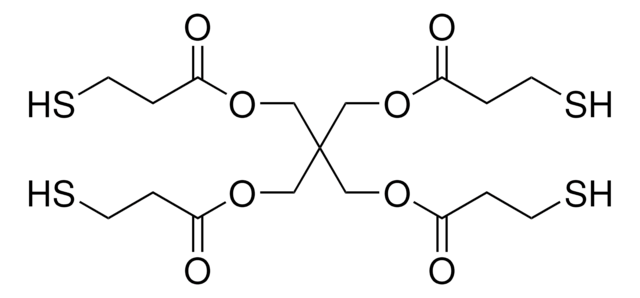374350
Tridodecylmethylammonium iodide
97%
Synonym(s):
Methyltridodecylammonium iodide
Sign Into View Organizational & Contract Pricing
All Photos(2)
About This Item
Linear Formula:
[CH3(CH2)11]3N(I)CH3
CAS Number:
Molecular Weight:
663.93
Beilstein:
4260774
MDL number:
UNSPSC Code:
12352116
PubChem Substance ID:
NACRES:
NA.22
Recommended Products
Quality Level
Assay
97%
mp
106-107 °C (lit.)
SMILES string
[I-].CCCCCCCCCCCC[N+](C)(CCCCCCCCCCCC)CCCCCCCCCCCC
InChI
1S/C37H78N.HI/c1-5-8-11-14-17-20-23-26-29-32-35-38(4,36-33-30-27-24-21-18-15-12-9-6-2)37-34-31-28-25-22-19-16-13-10-7-3;/h5-37H2,1-4H3;1H/q+1;/p-1
InChI key
JRLISGAUAJZAGL-UHFFFAOYSA-M
Looking for similar products? Visit Product Comparison Guide
Related Categories
Application
Tridodecylmethylammonium iodide (3C12MAI) can be used:
- As a triple-chained cationic surfactant.
- to prepapre glucose oxidase enzyme immobilized iodide electrode for the detection of glucose concentration.
- As a cationic phase-transfer catalyst in the oxidation of hydrocarbons by O2.
Storage Class Code
11 - Combustible Solids
WGK
WGK 3
Flash Point(F)
Not applicable
Flash Point(C)
Not applicable
Personal Protective Equipment
dust mask type N95 (US), Eyeshields, Gloves
Choose from one of the most recent versions:
Already Own This Product?
Find documentation for the products that you have recently purchased in the Document Library.
The role of onium salts in the oxidation of hydrocarbons by O 2 catalysed by cationic phase-transfer reagents
Csanyi L, et al.
Physical Chemistry Chemical Physics, 2(17), 3801-3805 (2000)
Preparation and application of a new glucose sensor based on iodide ion selective electrode
K Sukru, et al.
Talanta, 65(1), 87-91 (2005)
A B Packard et al.
Nuclear medicine and biology, 22(7), 887-891 (1995-10-01)
Iridium-191m is an attractive radionuclide for first-pass radionuclide angiography, but development of an 191Os/191mIr generator with high 191mIr yield has proven difficult. The use of trans-dioxobisoxalatoosmate(VI) as a parent species results in a higher initial yield (20 to 25%/mL), but
Y B Kim et al.
Journal of Korean medical science, 9(5), 357-361 (1994-10-01)
Expanded polytetrafluoroethylene(ePTFE) grafts 4mm long and 1mm in diameter were implanted into the iliac artery of 100-150g male rats using standard microvascular technique. Prior to clamp removal, the cremaster muscle was isolated as an island flap based on the iliac
A J Freeman et al.
Journal of pharmacological methods, 23(1), 7-11 (1990-03-01)
The patency of chronically implanted intravascular cannulae is usually limited by thrombus formation at the cannula tip. In the present experiments, methods of improving the antithrombotic properties of the cannulae have been examined using a number of different heparin-bonding treatments.
Our team of scientists has experience in all areas of research including Life Science, Material Science, Chemical Synthesis, Chromatography, Analytical and many others.
Contact Technical Service








